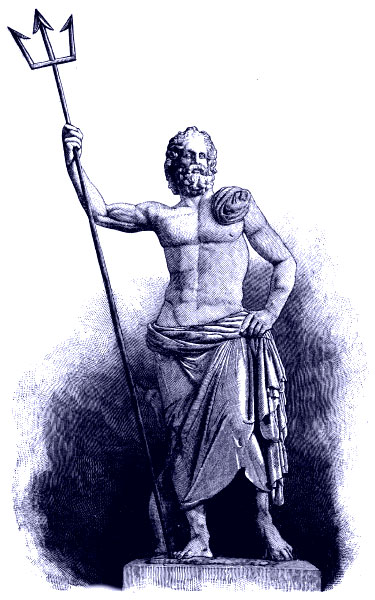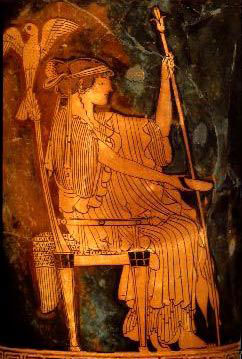Dionysus
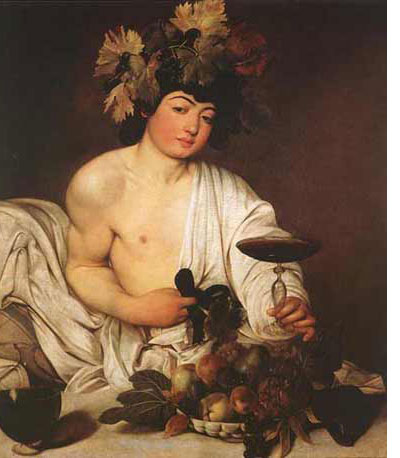 Dionysus or Dionysos is the Greek god of wine and he represents not only the intoxicating power of wine, but also its social and beneficial influences. He was also known as Bacchus. He is the patron deity of agriculture and the theatre. He was also known as the Liberator, freeing one from one's normal self, by madness, ecstasy, or wine. The divine mission of Dionysus was to mingle the music of the avlos and to bring an end to care and worry.
Dionysus or Dionysos is the Greek god of wine and he represents not only the intoxicating power of wine, but also its social and beneficial influences. He was also known as Bacchus. He is the patron deity of agriculture and the theatre. He was also known as the Liberator, freeing one from one's normal self, by madness, ecstasy, or wine. The divine mission of Dionysus was to mingle the music of the avlos and to bring an end to care and worry.In Greek mythology Dionysus was the son of Zeus and Semele and he is described as being womanly in appearance. Dionysus had an unusual birth that evokes the difficulty in fitting him into the Olympian pantheon. His mother was the daughter of Cadmus, a mortal woman and when Zeus' wife, Hera, heard that she was pregnant with a child of Zeus she was so jealous that she became Semele's friend disguised as an old lady or a nurse and when Semele confided in her that her husband was actually Zeus Hera pretended not to believe her and planted seeds of doubt in Semele's mind. Curious, Semele demanded of Zeus that he reveal himself in all his glory as proof of his godhood. Though Zeus begged her not to ask this, she persisted and he agreed. Mortals, however, cannot look upon a god without dying. He came to her wreathed in bolts of lightning and she perished in the ensuing blaze. Zeus rescued the fetal Dionysus, however, by sewing him into his testicles. A few months later, Dionysus was born.
The name Dionysos is of uncertain significance. Nysa, for Greek writers, is either the nymph who nursed him or the mountain where he was attended by several nymphs, the Nysiads, who fed him and made him immortal as directed by Hermes or both.
The retinue of Dionysus was called the Thiasus and comprised chiefly Maenads.
He had several children such as Aglaea, Euphrosyne, Thalia, Oenopion, Phthonus, Acis Deianeira and so on.
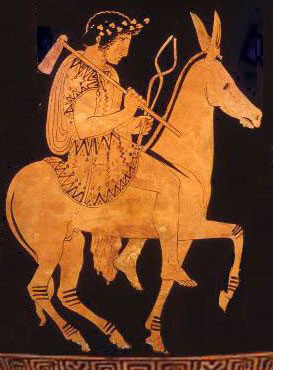 Hephaestus was the god of technology, blacksmiths, craftsmen, artisans, sculptors, metals and metallurgy and fire. There were numerous celebrations on his honor and he was worshipped in all the manufacturing and industrial centers of Greece and especially Athens. He was the son of Zeus and Hera and his brother was Ares. Hera gave birth to him on her own because she got jealous when Zeus had given birth to Athena who came out of his head. He was very ugly and when he tried to rape the goddess Athena he ejaculated on Gaia who gave birth to a child named Erichthonius who was given to Athena after birth to be raised as her son. Hephaestus was married to Aphrodite, the most beautiful goddess, because of Zeus who wanted her married because he was afraid all the other male gods would quarrel over her for her beauty. She didn't want him so she had other lovers as his brother Ares. The myth says that the Sun-God Helios once spied Ares and Aphrodite enjoying each other secretly in the hall of Hephaestus and he promptly reported the incident to Aphrodite's Olympian consort. Hephaestus contrived to catch the couple in the act, and so he fashioned a net with which to snare the illicit lovers. At the appropriate time, this net was sprung and trapped Ares and Aphrodite in a very private moment. But Hephaestus was not yet satisfied with his revenge - he invited the Olympian gods and goddesses to view the unfortunate pair. For the sake of modesty, the goddesses demurred, but the male gods went to witness the sight. Some commented on the beauty of Aphrodite, others remarked that they would eagerly trade places with Ares, but all mocked the two. Once the couple were loosed, Ares, embarrassed, sped away to his homeland, Thrace.
Hephaestus was the god of technology, blacksmiths, craftsmen, artisans, sculptors, metals and metallurgy and fire. There were numerous celebrations on his honor and he was worshipped in all the manufacturing and industrial centers of Greece and especially Athens. He was the son of Zeus and Hera and his brother was Ares. Hera gave birth to him on her own because she got jealous when Zeus had given birth to Athena who came out of his head. He was very ugly and when he tried to rape the goddess Athena he ejaculated on Gaia who gave birth to a child named Erichthonius who was given to Athena after birth to be raised as her son. Hephaestus was married to Aphrodite, the most beautiful goddess, because of Zeus who wanted her married because he was afraid all the other male gods would quarrel over her for her beauty. She didn't want him so she had other lovers as his brother Ares. The myth says that the Sun-God Helios once spied Ares and Aphrodite enjoying each other secretly in the hall of Hephaestus and he promptly reported the incident to Aphrodite's Olympian consort. Hephaestus contrived to catch the couple in the act, and so he fashioned a net with which to snare the illicit lovers. At the appropriate time, this net was sprung and trapped Ares and Aphrodite in a very private moment. But Hephaestus was not yet satisfied with his revenge - he invited the Olympian gods and goddesses to view the unfortunate pair. For the sake of modesty, the goddesses demurred, but the male gods went to witness the sight. Some commented on the beauty of Aphrodite, others remarked that they would eagerly trade places with Ares, but all mocked the two. Once the couple were loosed, Ares, embarrassed, sped away to his homeland, Thrace.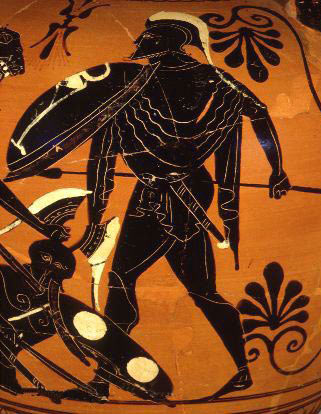 In Greek mythology, Ares is the son of Zeus and Hera. Though often referred to as the Olympian god of war, he is more accurately the god of savage war, or bloodlust, or slaughter personified. Among the Greeks Ares was always distrusted and although Ares' half-sister Athena was also considered to be a war deity, Athena's stance was that of strategic warfare while Ares' tended to be the unpredictable violence of war. His birthplace and true home was placed far off, among the barbarous and warlike Thracians, to whom he withdrew after he was discovered on a couch with Aphrodite.
In Greek mythology, Ares is the son of Zeus and Hera. Though often referred to as the Olympian god of war, he is more accurately the god of savage war, or bloodlust, or slaughter personified. Among the Greeks Ares was always distrusted and although Ares' half-sister Athena was also considered to be a war deity, Athena's stance was that of strategic warfare while Ares' tended to be the unpredictable violence of war. His birthplace and true home was placed far off, among the barbarous and warlike Thracians, to whom he withdrew after he was discovered on a couch with Aphrodite.
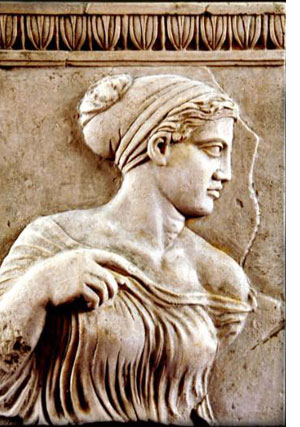
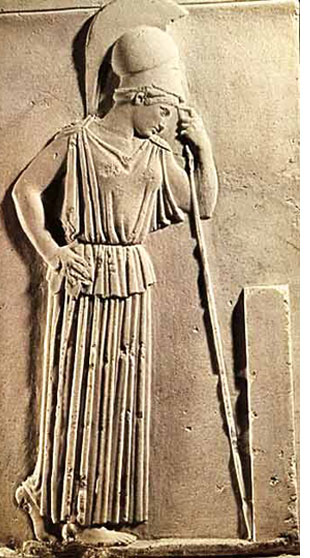 The myth says that Zeus had swallowed his first wife Metis when he found out that she was pregnant. He was afraid that the prophecy of his son taking his throne would come true if the child was a boy. In remorse, he asked another god to split his head from where Athens popped out, a beautiful full-grown daughter, dressed in golden battle armor. She soon became his favorite and the only one of his children that Zeus ever entrusted with his magic shield and the secret of where his lightening bolts were stored. Athena remained his constant ally and fierce protector, promoting his interests, serving as his advisor.
The myth says that Zeus had swallowed his first wife Metis when he found out that she was pregnant. He was afraid that the prophecy of his son taking his throne would come true if the child was a boy. In remorse, he asked another god to split his head from where Athens popped out, a beautiful full-grown daughter, dressed in golden battle armor. She soon became his favorite and the only one of his children that Zeus ever entrusted with his magic shield and the secret of where his lightening bolts were stored. Athena remained his constant ally and fierce protector, promoting his interests, serving as his advisor.
 Apollo was a very handsome Greek god who resembled the Kouros statues, meaning he was athletic, beardless and young. In Greek mythology he was the god of medicine and healing, light, truth, archery and also a bringer of death-dealing plague. He was also the god of music and poetry and the leader of the Muses and director of their choir. Hymns sung to Apollo were called paeans.
Apollo was a very handsome Greek god who resembled the Kouros statues, meaning he was athletic, beardless and young. In Greek mythology he was the god of medicine and healing, light, truth, archery and also a bringer of death-dealing plague. He was also the god of music and poetry and the leader of the Muses and director of their choir. Hymns sung to Apollo were called paeans.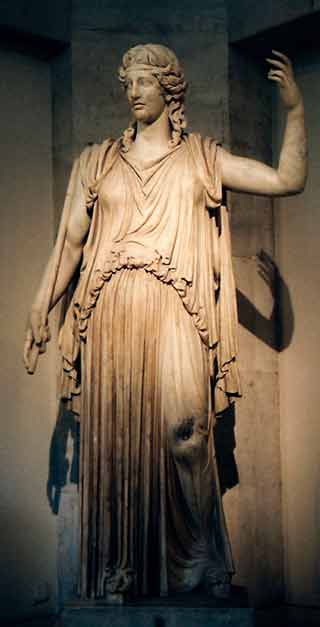 Demeter is the goddess of fertility and agriculture. She taught people how to sow and plough and that is why she was very popular with the rural population. As a fertility goddess she is sometimes identified with Rhea and Gaia. She is the daughter of Cronus and Rhea and sister of Zeus by whom she became the mother of Persephone. When Persephone was abducted by Hades, the lord of the underworld, Demeter wandered around the earth to find her and during that time nothing was growing on earth. Then, Zeus sent Hermes to the underworld to bring Persephone back and Hades agreed but when the girl was leaving the underworld he gave her a pomegranate and when she ate the fruit she was bound to spend a third of the year with her husband in the infernal regions. For that reason, Demeter lets the earth grow only during the summer that her daughter is with her. The dying and blossoming of nature was thus connected to Demeter.
Demeter is the goddess of fertility and agriculture. She taught people how to sow and plough and that is why she was very popular with the rural population. As a fertility goddess she is sometimes identified with Rhea and Gaia. She is the daughter of Cronus and Rhea and sister of Zeus by whom she became the mother of Persephone. When Persephone was abducted by Hades, the lord of the underworld, Demeter wandered around the earth to find her and during that time nothing was growing on earth. Then, Zeus sent Hermes to the underworld to bring Persephone back and Hades agreed but when the girl was leaving the underworld he gave her a pomegranate and when she ate the fruit she was bound to spend a third of the year with her husband in the infernal regions. For that reason, Demeter lets the earth grow only during the summer that her daughter is with her. The dying and blossoming of nature was thus connected to Demeter.